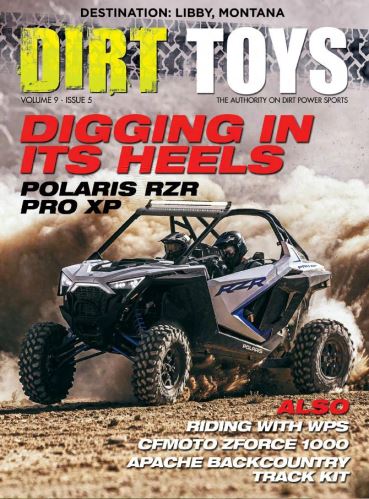Okanogan County’s ordinance opening almost 600 miles of roads to wheeled all-terrain vehicles (ATVs) has been invalidated because the county failed to analyze the environmental impacts of allowing ATVs to use these roads, the state Court of Appeals in Spokane ruled last week.
In a ruling that the judges themselves called “a painfully long opinion,” they found the county’s environmental review was “almost devoid of specific information.”
“Okanogan County’s environmental checklist contains repetitive, superficial, conclusory statements regarding the potential environmental impact of opening nearly 600 miles of county roads to ATV use,” wrote Chief Judge George Fearing in the 2-to-1 ruling.
The 114-page opinion was issued June 16 by a 3-judge panel for the appeals court.
The lawsuit was brought against Okanogan County by the Methow Valley Citizens’ Council (MVCC) and Conservation Northwest, who contended that allowing ATVs to use all county roads with speed limits of 35 miles per hour (mph) or less would have significant impacts on the environment. The county is required to take these impacts into account, they said.
The judges agreed that the state Environmental Policy Act (SEPA) requires the county to assess potential impacts on the environment, including on water, air quality and wildlife habitat. They ordered county officials to prepare an environmental checklist that includes a complete disclosure and review of relevant information if the county wants to adopt another ordinance allowing ATVs to travel on county roads.
The environmental review must cover increased traffic, off-road use, noise and the impact on endangered species, caused by both legal and illegal traffic, among other issues.
Okanogan County is reviewing the judges’ opinion and all of its legal options, said Albert Lin, the county’s chief civil deputy prosecuting attorney, this week.
The checklist for the ATV ordinance was prepared by Okanogan County Planning Director Perry Huston. Huston concluded that because ATVs would be traveling on existing roads already used by other vehicles, there would be no new environmental impacts.
In their opinion, the judges quoted at length from the plaintiffs’ brief and from comments submitted to the county that provided examples of environmental damage caused when ATVs are operated off roads.
Their opinion included only brief excerpts from letters sent to the county by people who advocated more ATV access. Supporters of expanded access pointed to existing noise and air pollution from other vehicles and the economic benefits ATV riders would bring the county.
The judges found that the county’s approach runs counter to the purpose of the state law and to the county’s own goals. Despite Okanogan County’s stated intent to open roads to ATV use to increase ATV-based tourism and recreation, the county insists that the ordinance will not substantially increase ATV traffic, they said.
Judge Kevin Korsmo dissented from the opinion. He observed that “no new asphalt or gravel will be poured” and that the only changes caused by the ordinance were to allow a certain subclass of ORVs [off-road vehicles] to drive on existing roadways alongside other vehicles.
But the plaintiffs argued that allowing ATVs to ride on roads near environmentally sensitive areas, such as wetlands or steep slopes, could tempt some riders to traverse these areas, particularly because ATVs are designed for off-road use.
“It may be illegal to go off-road, but what we presented was overwhelming evidence that people do it,” said Melanie Rowland, an MVCC board member and one of the attorneys for plaintiffs.
“We know that most ATV riders are very responsible, but you can’t deny the facts – there is a lot of environmental damage from operators who act illegally,” she said.
Korsmo rejected the argument that state environmental law requires the county to conduct more analysis. “The ordinance does not authorize WATVs [wheeled ATVs] … to leave the roadway … There will always be people who violate the laws, but we do not measure the environmental impacts of a new regulation by looking to the conduct of those who violate other laws,” he wrote.
Korsmo said state law attempts to balance the interests of different groups. “In a more perfect world ORVs [off-road vehicles] would not have been invented. In a more enlightened jurisdiction, the pestilential devices would be banned. However, we live in neither locale. The policy of this state is to encourage responsible use of our beautiful environment by all comers in differing manners,” he wrote.
“As we’ve said all along, we aren’t opposed to ATVs operating in the right places; we object to the fact that the county violated the law and ignored impacts on the environment when adopting a sweeping ordinance like this one,” said Rowland.
History of the case
The dispute over where ATVs may travel in the county dates back to a 2013 state law that was intended to increase opportunities for ATV riders while decreasing unlawful and environmentally harmful motorized recreation.
Immediately after the law went into effect, the Okanogan County commissioners opened all county roads with speed limits under 35 mph to ATVs. They were compelled to close the roads again after a challenge by MVCC and Conservation Northwest over the lack of an environmental review.
The ordinance at issue in this case was adopted in 2014, accompanied by the environmental checklist the judges deemed inadequate. That environmental review had been upheld in Okanogan County Superior Court in 2014.
Okanogan County has 20 days from the date of the opinion to request a reconsideration by the Appeals Court panel and 30 days to ask the state Supreme Court to take the case.
While the judges’ opinion voids the ATV ordinance, the road status does not change until the court issues a mandate after the appeal window expires, said David Mann, the plaintiffs’ attorney.
The judges also awarded legal fees to MVCC and Conservation Northwest.

